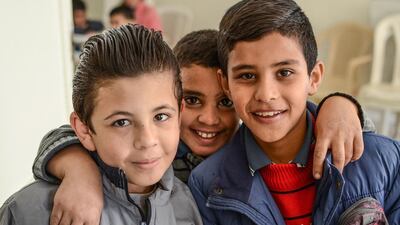SHATILA, Lebanon // Overcrowding, poverty and pollution plague Shatila, the Palestinian refugee camp haunted by ghosts from Lebanon’s past. But despite its notoriety, no one knows exactly how many people live here.
Its name still synonymous with the 1982 massacre of hundreds of people in the camp and the adjacent neighbourhood of Sabra, Shatila’s squalid conditions have been exacerbated by the arrival of thousands of refugees from Syria.
Last February, the International Federation of Red Cross and Red Crescent Societies said the camp's population had swelled from 10,000 to 16,000 since the start of the Syrian civil war in 2011.
But according to people currently living and working inside the camp in southern Beirut, these figures are much higher.
Abed Moubayed from Basmeh and Zeitooneh, an NGO that works with refugees from Syria in Shatila, as well as pre-existing residents, says that before 2011, the camp’s population stood at 20,000. Since then it has nearly doubled to almost 40,000, he says.
Meanwhile, Abu Moujahed, a longtime resident of Shatila and director of the camp’s Children and Youth Centre, an NGO that provides education and recreational activities for six to 18-year-olds, puts the current population at about 22,500. The population had reached about 18,000 before 2011, he says, but since then about 5-6,000 refugees from Syria have moved into the camp and the surrounding areas.
The UN agency for Palestinian refugees (UNRWA) says that as of July 2014, there were more than 9,842 Palestinian registered refugees living in Shatila. But this figure does not take into account the many Palestinian refugees who are not registered, or the camps’s non-Palestinian residents, who include poor Lebanese, Syrians, immigrants from elsewhere in the Middle East and South Asia.
Established in 1949 for just 3,000 people, Shatila still occupies the same space today — less than one square kilometre in size — despite the vast increase in its population.
In pictures: Life goes on amid suffering of Beirut’s Shatila refugee camp
Its darkest days came in September 1982 during Lebanon’s civil war when Christian militia systematically slaughtered refugees trapped inside the camps by an Israeli military cordon. The Red Cross estimates up to 1,000 Palestinians and Lebanese were killed over three days.
The end of the conflict brought an improvement in conditions, but even before 2011 and the influx of refugees from Syria, life remained tough.
Today, the only running water in the camp is salty and unsuitable for drinking; bundles of tangled electricity wires hang overhead in the streets, with several people electrocuted every year; mice run through buildings and the daily power cuts experienced in Beirut’s northern neighbourhoods appear a luxury compared to the outages here — which can last for most of the day, rather than a few hours.
There is no greenery in the camp and one of the only open spaces is a dirt yard outside the Children and Youth Centre, where pregnant women wait for appointments at the nearby maternity centre, and where young boys play football with a rusty metal wood burner.
Palestinian residents are unable to gain Lebanese citizenship and hold few rights.
But “what has made [life in the camp] more tragic or difficult, more miserable, has been the Syrian war”, says Abu Moujahed, whose name is known by practically everyone in the camp.
With the arrival of thousands of extra people, “life became unbearable,” he says.
“You can’t say no to those people because they are coming like us before, fleeing from death. And some of them are your relatives. So you have to share with them whatever you have: bread or water or space.”
One resident says the camp is growing bigger by the day to accommodate its new arrivals. But with Shatila unable to expand outwards, residents are forced to build upwards. It is common to see five extra floors tacked onto what were once one storey dwellings. And with each extra storey, the floors get wider — often buildings that are a couple of metres apart at ground level are touching by the time they reach the top.
Listen: A longtime resident of the camp talks about what it’s like to live here
Outside of Shatila, myths and prejudices abound about the camp. Many taxi drivers in Beirut’s wealthier areas are loathe to make journeys there and it is not uncommon for them to try to convince their passengers to turn back, warning that the camp is not safe.
But although — much like the rest of Beirut — Shatila is not immune from violence, life goes on here — be it in the children learning dabka in the Children and Youth Centre’s library, or in the raucous evening wedding procession that passes through the yard outside.
Meanwhile, as Shatila bursts at its seams with the numbers of displaced, NGOs like the Children and Youth Centre and Basmeh and Zeitooneh are working to alleviate some of the hardship.
The latter is currently working with 1,000 families in Shatila through ten different programmes. These range from a women’s workshop that exports high quality handmade textile goods to international markets, to a project that renovates houses “like new”, using both labourers and materials sourced from the camp, says Mr Moubayed, manager of the NGO’s community centre in Shatila.
In November the centre began holding a small workshop every Sunday to provide psychosocial support for men — a group that charities and aid organisations have previously struggled to target in Lebanon, according to the UN refugee agency (UNHCR). The workshops include relaxation and group cooking sessions.
“We thought that it wouldn’t work,” says Mr Moubayed. “Especially here in the camp because a lot of men don’t believe in this kind of support.
“But when they came and they felt comfortable and safe and saw a good impact, they told other people, and now we [have enough men to] start a new workshop.”
lmackenzie@thenational.ae

